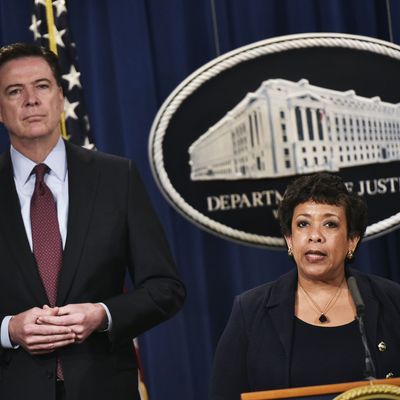
Last year, the FBI obtained a document that suggested Attorney General Loretta Lynch had promised to obstruct the investigation into Hillary Clinton’s email server should it start to threaten her campaign. The intelligence consisted of a supposed email exchange between then–Democratic National Committee Chair Debbie Wasserman Schultz and a Clinton campaign operative — one whom Schultz did not actually know.
James Comey quickly discerned that the document was a forgery composed by Russian agents. But the then–FBI director chose to act as though it were real, anyway — presenting the emails to Congress as authentic intelligence, and freezing Lynch out of major decisions on the Clinton investigation, as though she were, in fact, compromised.
This decision led Comey to declare the investigation over last summer — while offering a detailed, public criticism of Clinton’s actions, in apparent violation of Justice Department protocol — without soliciting the attorney general’s input.
Or so a bunch of anonymous officials whispered to CNN on Friday:
In classified sessions with members of Congress several months ago, Comey described those emails in the Russian claim and expressed his concern that this Russian information could “drop” and that would undermine the Clinton investigation and the Justice Department in general, according to one government official. Still, Comey did not let on to lawmakers that there were doubts about the veracity of the intelligence, according to sources familiar with the briefings. It is unclear why Comey was not more forthcoming in a classified setting.
Sources close to Comey tell CNN he felt that it didn’t matter if the information was accurate, because his big fear was that if the Russians released the information publicly, there would be no way for law enforcement and intelligence officials to discredit it without burning intelligence sources and methods.
In at least one classified session, Comey cited that intelligence as the primary reason he took the unusual step of publicly announcing the end of the Clinton email probe.
In that briefing, Comey did not even mention the other reason he gave in public testimony for acting independently of the Justice Department – that Lynch was compromised because Bill Clinton boarded her plane and spoke to her during the investigation, these sources told CNN.
CNN does not interrogate Comey’s rationale, and frames its story as an illustration of the Putin regime’s formidable powers.
But if this report is true, the FBI’s actions are far more alarming than the Kremlin’s. The idea that Russia would disseminate (transparently) false intelligence to undermine Hillary Clinton is, at this point, less than surprising. The idea that federal law enforcement would knowingly represent that intelligence to Congress as plausible — and then abandon the Justice Department’s chain of command on the basis of that false information — is shocking.
Comey’s rationale for taking these actions, as represented by CNN, make little sense. Ostensibly, Comey reasoned that if he made the FBI’s rationale for ending the investigation public — and did so while keeping Lynch out of the loop — this would mitigate the impact of Russia releasing its fake emails to the public.
But that’s insane. Marginalizing Lynch, and publicly calling Clinton “extremely careless,” did not buy Comey the trust of Fox News or the Republican nominee. Even without Russia’s fabrications, both Trump and right-wing media accused Comey of rigging the investigation in Clinton’s favor. If the fake emails had been released last August, there still would have been no way for Comey to convincingly discredit them without revealing “sources and methods” — or, honestly, even with revealing sources and methods.
What’s more, Comey’s rationale does not explain his decision to withhold his doubts about the intelligence from Congress. If your goal is to avoid tarnishing the Justice Department’s reputation, why would you present a mendacious attack on that reputation to lawmakers as legitimate?
It’s possible that CNN’s story is simply false — itself a fabrication of administration officials looking to tarnish Comey’s reputation.
But if it’s true, Comey’s actions say less about Russia’s capacity to subvert our government than the conservative movement’s: The FBI director’s actions do not make sense as a coldly rational response to a foreign adversary’s attempt at realpolitik, but rather as a panicked attempt to placate conservative politicians and media institutions whose demand — “lock her up” — he could not satisfy.
Trump’s firing of Comey was rightly seen as a disturbing attempt to politicize federal law enforcement. But it’s possible that said firing never would have happened had Trump’s party not already politicized the FBI in 2016.






























